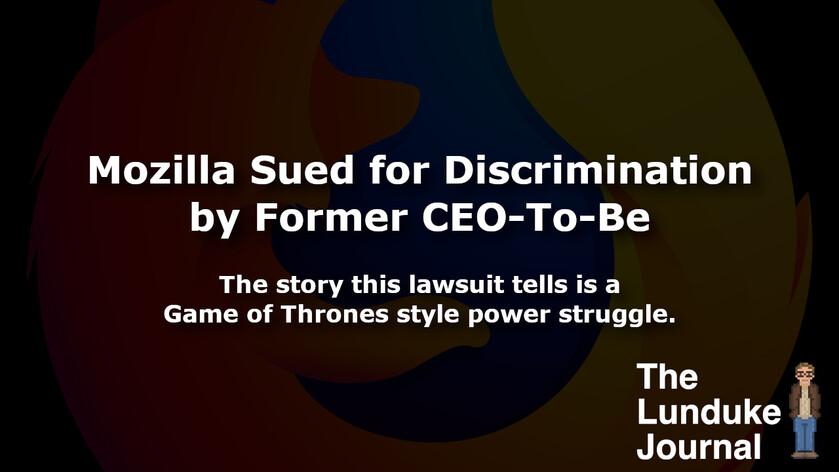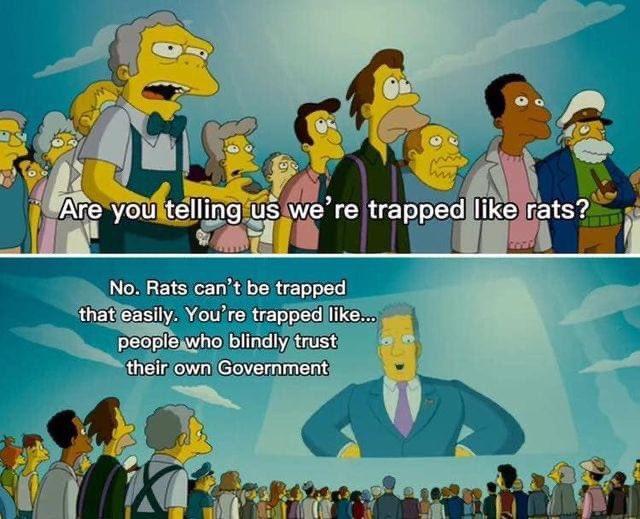The Lunduke Journal has obtained the legal documents regarding a new lawsuit which has been filed against Mozilla, makers of Firefox, by a former C-Level executive.
And parts of it read like a Game of Thrones style power struggle within the browser maker.
- The Mozilla Chief Product Officer was being groomed to take over as the new CEO.
- That CEO-to-be took some medical leave to treat cancer.
- In the days (literally) before the CEO-to-be returns from medical leave... the then-serving CEO of Mozilla, Mitchell Baker was fired -- by the Mozilla Board -- abruptly. No warning.
- The Mozilla Board of Directors then installed one of their own Board Members, Laura Chambers, as the new CEO.
- All before that "CEO-to-be" could return to work, from his medical leave, and take over the CEO position.
There is a lot here -- including a tale of discrimination and abuse inside the Mozilla Corporation.
Below are screenshots of large portions of this lawsuit -- the items of particular interest to tell this story -- with each screenshot followed by a brief description and some additional details. (If you're short on time, just read the descriptions between each screenshot... that will give you a high level overview of this story.)
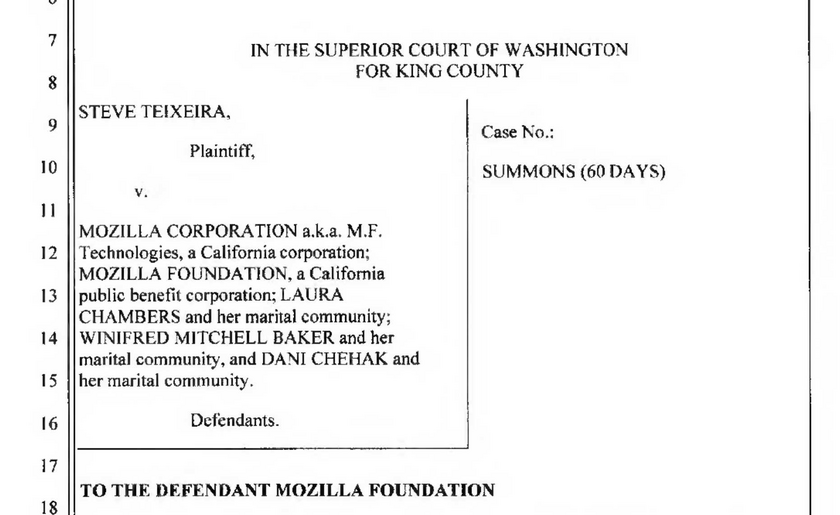
The lawsuit was filed by Steve Teixeria (the former Chief Product Officer of Mozilla), against Mozilla Corporation, in King County, Washington (Seattle), on June 12th, 2024.
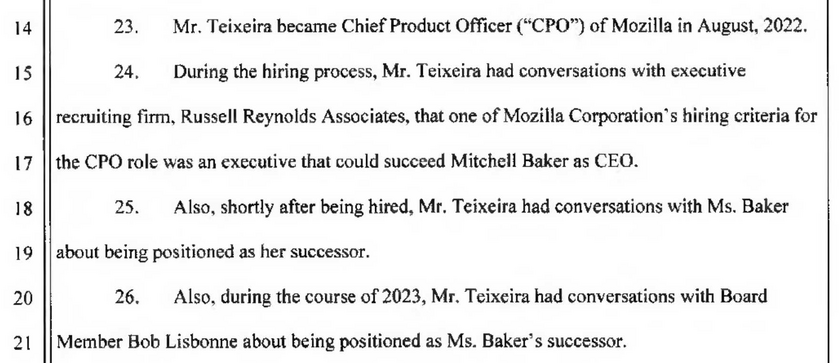
Teixeira, the new Chief Product Officer (CPO) of Mozilla was brought on board in 2022 and was being groomed to become the new CEO (to replace Mitchell Baker). This appeared to be the plan from Baker and at least one Mozilla Board Member.
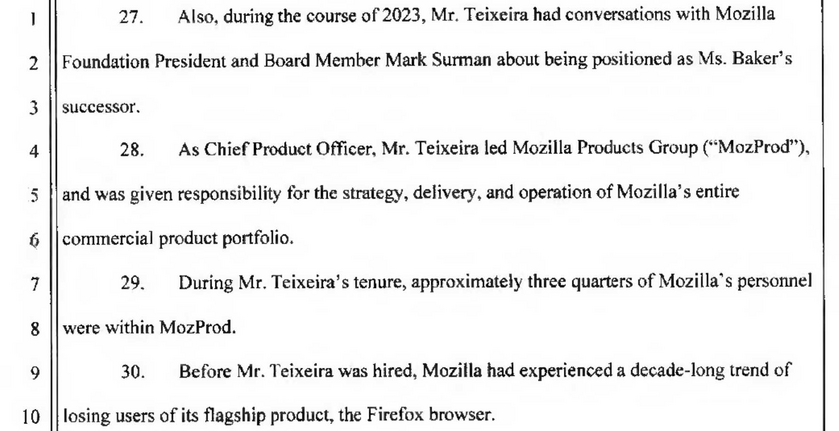
As CPO, Teixeira led roughly 75% of the employees of Mozilla, and oversaw the "entire commercial product portfolio".

Firefox is reaffirmed to be roughly 90% of Mozilla's revenue.
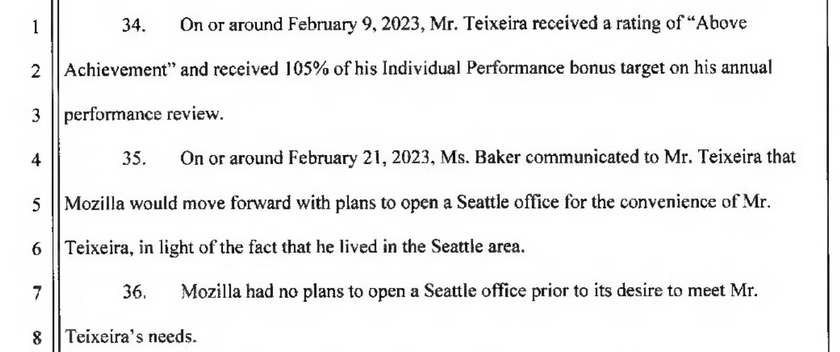
As CPO, Teixeira, was given high performance reviews.
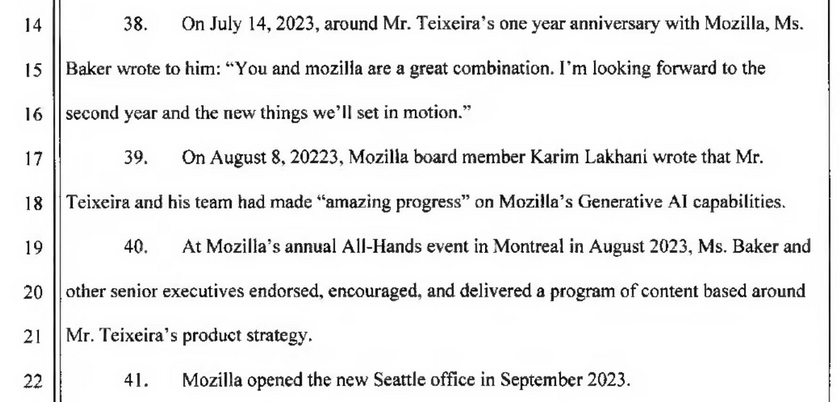
Mozilla opened an entire office branch -- in Seattle, WA -- to accommodate Teixeira. Which would make sense if the plan was to make Teixeira the new CEO.

Through September of 2023, the plan remained to transition Teixeira to become the CEO of Mozilla.

Teixeira was diagnosed with cancer (ocular melanoma) in October of 2023. He then took leave (under the Family Medical Leave Act) until February of 2024. Mitchell Baker remained CEO during that time... until the days before Teixeira returned to work.
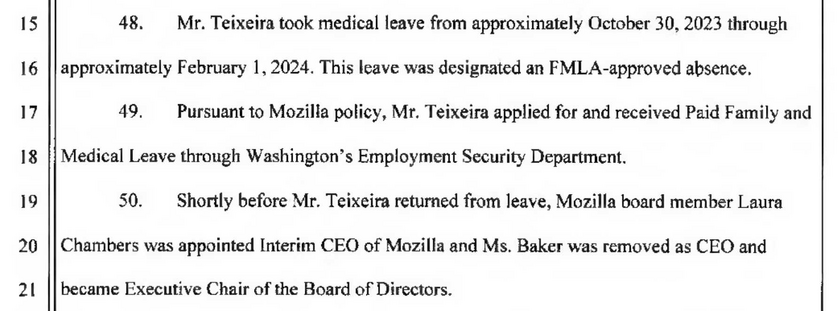
Mozilla publicly announced their new CEO, Laura Chambers, on February 8th, 2024.
According to this legal filing, that decision was made (by the Mozilla Board), internally, roughly a week prior. This would be "shortly before Mr. Teixeira" returned from leave on February 1st, 2024.

This legal filing appears to say that Mitchell Baker was fired, by the Mozilla Board of Directors -- from her role as the CEO of Mozilla due to her "declining performance".

The timing here is interesting.
According to the legal filing, the firing of Mitchell Baker as Mozilla CEO was "so abrupt that they did not conduct a search for a successor".
Meaning: They were in a hurry. For whatever reason, the Mozilla Board needed to act right then.
And the Mozilla Board -- which included Laura Chambers -- voted to install Laura Chambers as the new CEO.
All of this happened the very moment the person who was being groomed to take over as CEO, Teixeira, returned from his medical leave -- and was set to resume overseeing roughly 75% of Mozilla.
Was this the motivation for moving so quickly to install a new CEO? To do so prior to Teixeira returning and taking over?
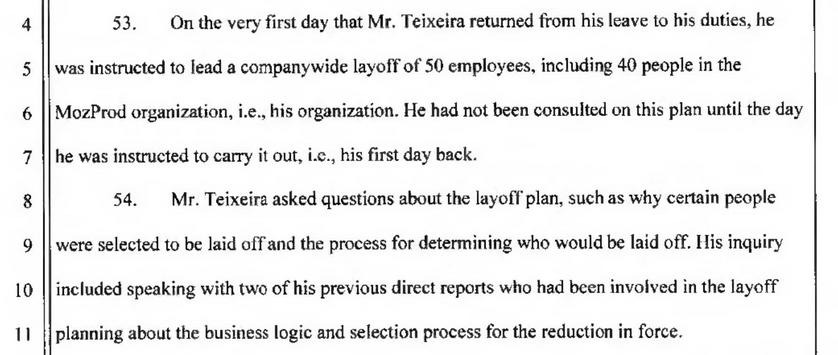
The first day back as CPO, Teixeira was instructed to lay off 50 (already selected) employees. He had questions about who had been selected to be laid off.

Teixeira's employees were "explicitly forbidden", by the "Chief People Officer" of Mozilla (Dani Chehak), from briefing and assisting Teixeira as he returned from leave.

Teixeira expressed concerns, with Human Resources at Mozilla, that these layoffs would "disproportionately impact" "female leaders" and "persons of color".

Teixeira was threatened, by the Chief People Officer (Chehak) to be forcibly placed "back on medical leave" if he "did not execute the layoffs as instructed".
Do what we say, fire these exact people, and don't talk to anyone about it. Or get out.
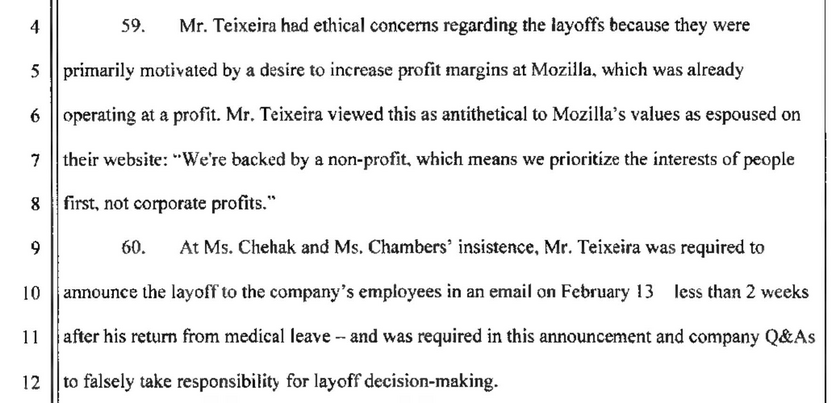
The new CEO, Laura Chambers, and the Chief People Officer, Chehak, insisted that Teixeira not only announce the layoffs... but falsely take responsibility for the layoff decision-making.
According to this document, Laura Chambers was throwing the person that was being groomed to be the CEO under the bus.

Teixeira was "permitted only to speak with the CEO and her direct reports". His staff -- roughly 75% of Mozilla - was delayed being moved back under his leadership.

There was an "outside audit" done of Mozilla's performance in "providing a diverse, equitable, and inclusive workplace culture" by Tiangay Kemokai Law, P.C..

According to that outside report, Mozilla's leadership provides an "inadequate response to the needs of a diverse culture" and is "incongruent with [Mozilla's] stated values and goals."
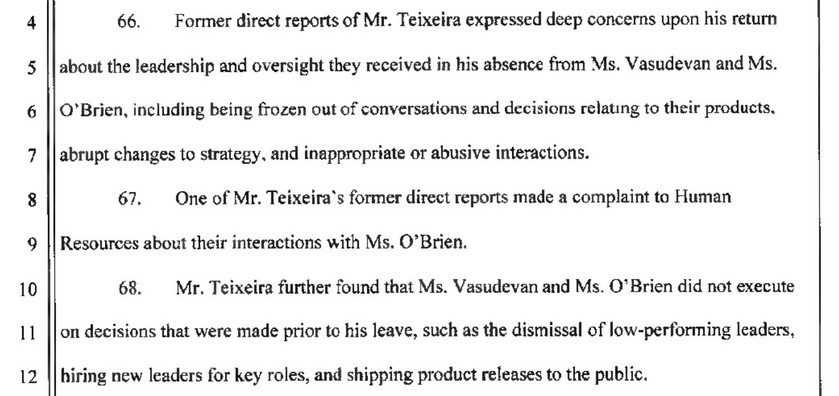
Teixeira's former direct reports expressed, to him, "deep concerns" about leadership in his absence. Specifically regarding "abrupt changes to strategy" and "inappropriate or abusive interactions" from the Senior VP of Strategy Operations (Suba Vasudevan) and the Chief Marketing Officer (Lindsey O'Brien).
This included complaints made to Human Resources regarding the Chief Marketing Officer.
What those complaints were, we do not know.
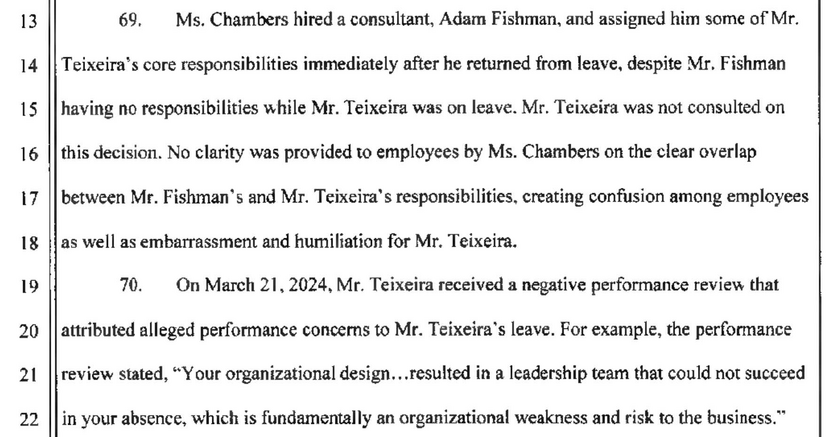
The new CEO, Laura Chambers, hired a consultant to assume Teixeira's core responsibilities after Teixeira returned from medical leave.
Teixeira then received, from the newly installed CEO, his first negative performance review.
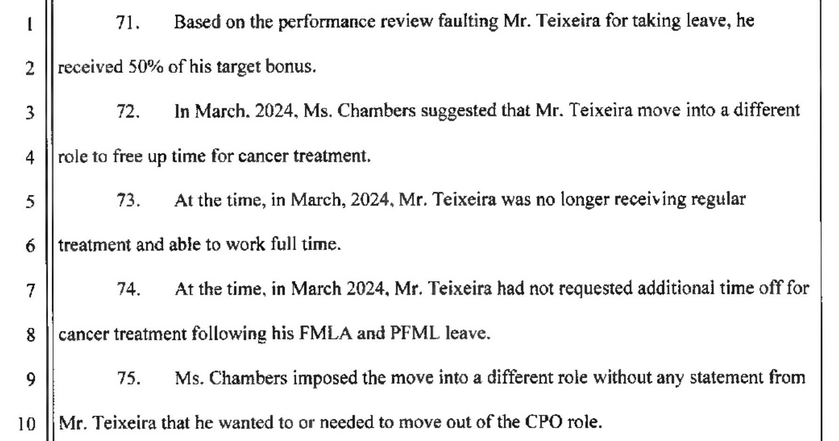
Teixeira -- once groomed to be the new CEO -- now was being forced to move into a new role. Which he did not want or ask for.
At this time he was able to work full time and did not request time off for medical care.
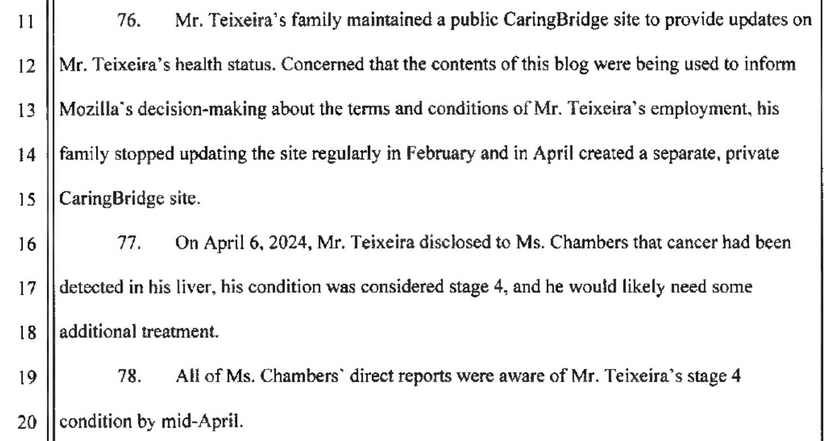
Teixeira's family believed that Mozilla was gathering his publicly available medical information, to be used against him in his employment. His family then begins to remove public information regarding his medical status.
Teixeira disclosed to the new CEO (Laura Chambers) that liver cancer had been detected.
That information was then shared -- according to other statements within the lawsuit, by Laura Chambers -- with all of her direct reports.

Mozilla then makes it clear they wished to demote Teixeira (from a C-level executive down to a Vice President role).

Teixeira declined the demotion (which would come with a 40% pay cut and the job would end, entirely, at the end of the year).
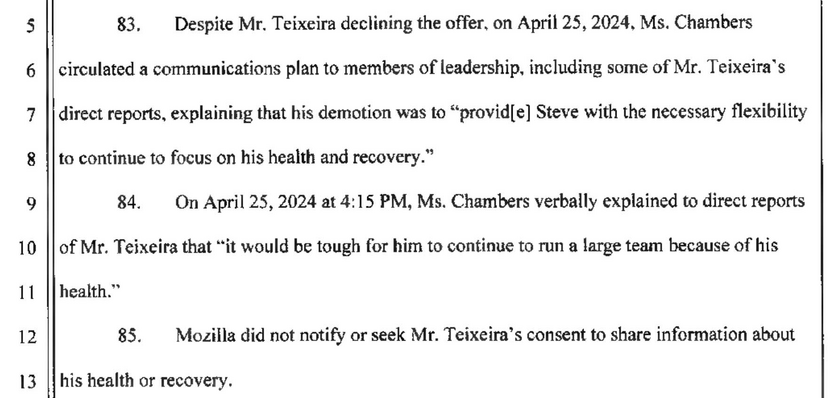
Mozilla's CEO, Laura Chambers, then disclosed significant, private details of Teixeira's medical conditions to other Mozilla employees. Without Teixeira's consent.
Chambers also told other Mozilla employees that Teixeira would be demoted (the demotion that he had just rejected).
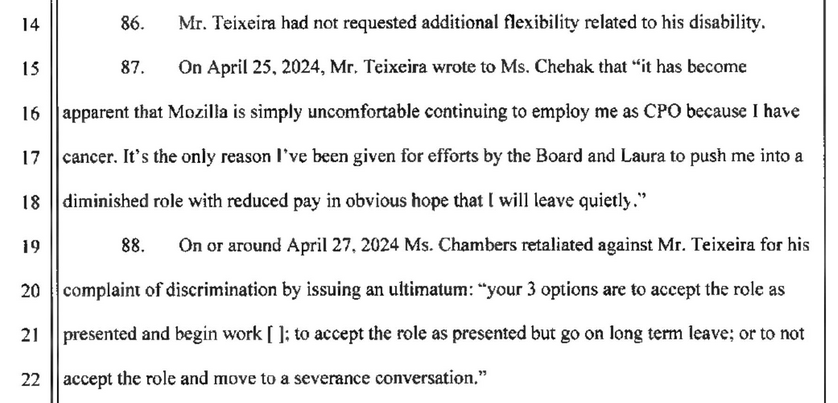
A key note here: Teixeira had "not requested additional flexibility related to his disability."
On April 25th, Teixeira made a complaint, in writing, that he had been discriminated against because of his cancer. Two days later, on April 27th, the CEO (Laura Chambers), "retaliated against Mr. Teixeira" by telling him, in a nutshell, to "take the demotion or you're fired."
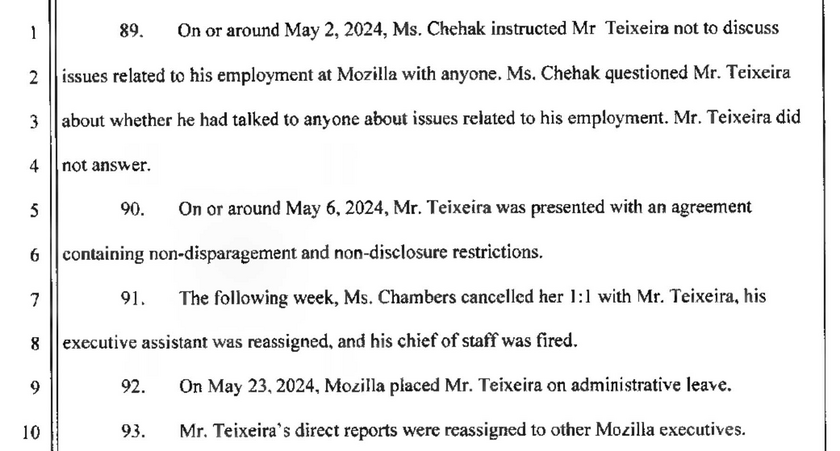
Mozilla, over the next couple days, began panicking -- instructing Teixeira not to discuss anything related to his employment with Mozilla... with anyone. Even going so far as to draft up a new "non-disparagement and non-disclosure" document with new restrictions.
By the next week Teixeir was placed on "administrative leave". His direct reports all reassigned to other executives. His chief of staff fired.
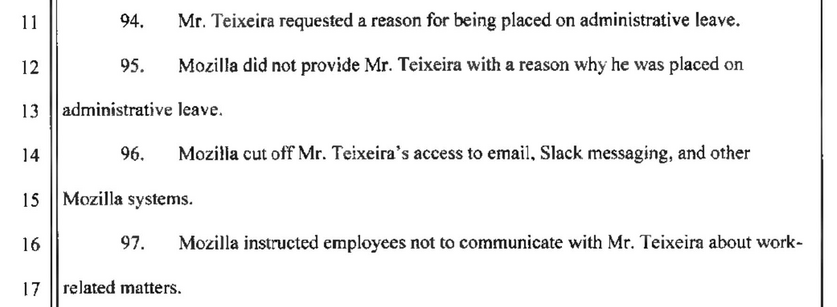
Mozilla refused to provide a reason for these actions.
Mozilla then cut off Teixeira's access to all Mozilla systems (including email and messaging) -- and instructed Mozilla employees to "not communicate with Mr. Teixeira."

A few weeks later an "investigation" was launched into Teixeira's discrimination allegations. However Teixeira was never contacted to participate in the investigation. Which is strange, to say the least.
Normally an "investigation" involves all parties involved.
It would be very interesting to see the full results of that "investigation".
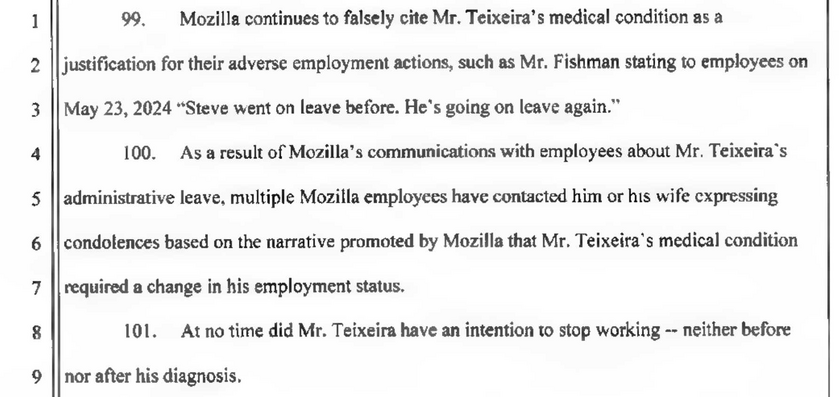
Mozilla continued to falsely state that Teixeira was on "medical leave", and provided Teixeira's medical details to other employees without his consent.
Which, if true, means Mozilla is likely going to be anxious to settle this lawsuit out of court.

This resulted in multiple Mozilla employees being led to believe that Teixeira "would pass away imminently" -- which, obviously, would be pretty distressing for both the remaining Mozilla employees and Teixeira and his family.
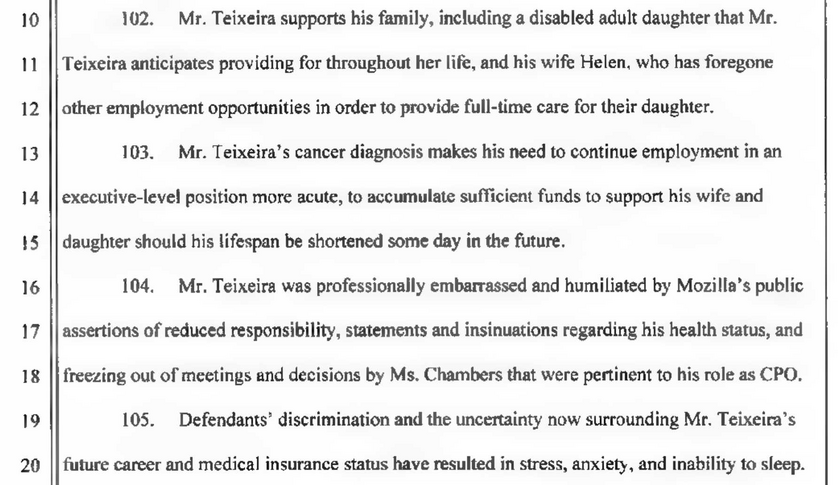
Based on the details of this lawsuit -- should the details all prove accurate -- it certainly doesn't paint Mozilla in a good light.
- A CEO ousted -- abruptly -- in the moments before a "New CEO-To-Be" returned to work and could take over?
- The Mozilla Board acting with lightning speed to install one of their own into the CEO position?
- Silencing. Scapegoating. Discrimination. Abuse.
Raises many, many questions about what has been going on within Mozilla... and how specific individuals rose to power within the organization.
This document, of course, is merely one side of the story.
Should this case move to trial, we would hear Mozilla's side of the story. That, however, seems unlikely... as these sorts of cases -- especially when they appear this strong -- tend to be settled pre-trial.
The Lunduke Journal has reached out to to both Mozilla and Teixeira for comment. As this is an ongoing lawsuit -- and Mozilla has a strong track record of silence and secrecy -- no response is expected.
